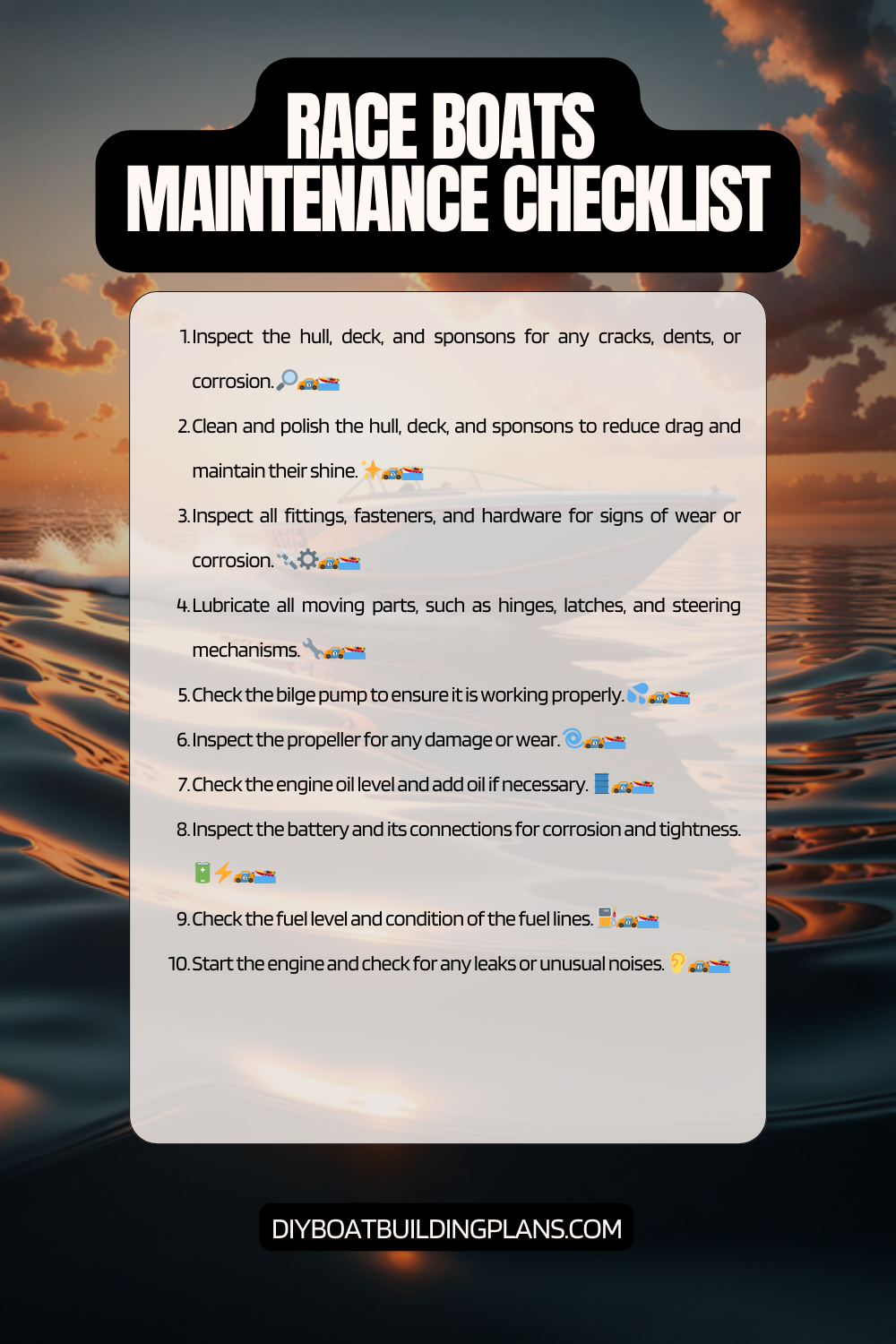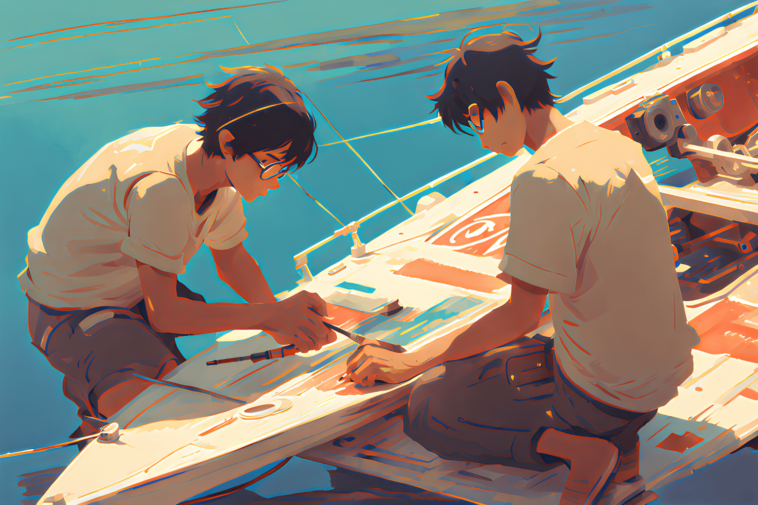Overview of Race Boat Maintenance Tips
Race boat maintenance is a crucial aspect of owning and operating a high-performance boat. It involves a series of tasks and checks that need to be performed regularly to ensure the boat’s optimal performance and safety. From engine maintenance to hull inspections, every component of the boat requires attention and care. Neglecting maintenance can lead to breakdowns, costly repairs, and even safety hazards. Therefore, it is essential for race boat owners to understand the importance of regular maintenance and follow a comprehensive checklist to keep their boats in top condition.
Key Takeaways
- Regular maintenance is crucial for race boat performance and longevity.
- Pre-season and post-race checklists help ensure all necessary maintenance tasks are completed.
- Engine, propeller, hull, electrical system, trailer, and safety equipment all require specific maintenance.
- Proper maintenance can prevent costly repairs and improve safety on the water.
- Regular maintenance should be a priority for all race boat owners.

Importance of Regular Maintenance
Regular maintenance is vital for race boats as it offers numerous benefits. Firstly, it helps prevent breakdowns during races or while out on the water. By regularly inspecting and servicing the various components of the boat, potential issues can be identified and resolved before they escalate into major problems. This not only saves time but also ensures that the boat performs at its best during races.
Secondly, regular maintenance extends the life of the boat. By taking care of the engine, propeller, hull, electrical system, and other parts, owners can prolong the overall lifespan of their race boats. This not only saves money in the long run but also allows owners to enjoy their boats for many years to come.
On the other hand, neglecting maintenance can have severe consequences. Ignoring regular checks and servicing can lead to unexpected breakdowns during races or while out on the water. This not only ruins the experience but also poses safety hazards for both the occupants of the boat and other boaters nearby. Additionally, neglecting maintenance can result in costly repairs as minor issues can escalate into major problems if left unattended for too long.
Pre-Season Maintenance Checklist
Before the start of each boating season, it is crucial to complete a thorough pre-season maintenance checklist. This ensures that the boat is in optimal condition for a safe and successful season. Some essential tasks to include in the checklist are:
1. Check the battery: Inspect the battery for any signs of damage or corrosion. Clean the terminals and ensure that it is fully charged.
2. Inspect the hull: Thoroughly inspect the hull for any cracks, dents, or other damage. Repair any issues found and ensure that the hull is clean and free from debris.
3. Check the fuel system: Inspect the fuel lines, filters, and tanks for any leaks or damage. Replace any worn-out parts and ensure that the system is functioning properly.
4. Test the navigation lights: Ensure that all navigation lights are working correctly. Replace any bulbs that are burnt out or not functioning.
5. Check safety equipment: Inspect life jackets, fire extinguishers, flares, and other safety equipment to ensure they are in good condition and within their expiration dates.
Completing these tasks before the start of the boating season will help identify any potential issues and ensure a safe and successful season on the water.
Post-Race Maintenance Checklist
| Inspect brake pads and rotors | After every race | Mechanic | Completed |
| Check tire pressure and wear | After every race | Driver | Completed |
| Replace engine oil and filter | Every 3 races | Mechanic | Not completed |
| Inspect suspension components | After every race | Mechanic | Completed |
| Clean and lubricate chain | After every race | Driver | Completed |
After each race, it is essential to perform a post-race maintenance checklist to keep the boat in top condition and ready for the next race. Some tasks to include in this checklist are:
1. Clean the boat: Thoroughly clean the boat, both inside and out, to remove any dirt, grime, or saltwater residue. This helps prevent corrosion and keeps the boat looking its best.
2. Inspect the engine: Check the engine for any signs of damage or wear. Look for leaks, loose connections, or unusual noises. Address any issues promptly to prevent further damage.
3. Check propeller: Inspect the propeller for any damage or debris. Clean it thoroughly and ensure that it is securely attached to the shaft.
4. Test electrical systems: Check all electrical systems, including lights, gauges, and switches, to ensure they are functioning correctly. Replace any faulty components or wiring.
5. Inspect trailer: Examine the trailer for any signs of wear or damage. Check the tires, brakes, and lights to ensure they are in good working condition.
Completing these tasks after each race will help maintain the boat’s performance and prevent any potential damage from going unnoticed.
Engine Maintenance Tips
The engine is the heart of a race boat, and proper maintenance is crucial for optimal performance and safety. Here are some engine maintenance tips to follow:
1. Change the oil regularly: Regularly change the engine oil as per the manufacturer’s recommendations. This helps keep the engine running smoothly and prevents excessive wear.
2. Check the fuel system: Inspect the fuel lines, filters, and tanks for any leaks or damage. Clean or replace filters as needed to ensure proper fuel flow.
3. Monitor coolant levels: Check the coolant levels regularly and top up if necessary. Overheating can cause severe damage to the engine, so it is essential to keep an eye on coolant levels.
4. Inspect belts and hoses: Check all belts and hoses for signs of wear or damage. Replace any worn-out components to prevent unexpected failures.
5. Keep the engine clean: Regularly clean the engine to remove dirt, debris, and saltwater residue. This helps prevent corrosion and ensures optimal performance.
By following these engine maintenance tips, race boat owners can ensure that their engines perform at their best and avoid any unexpected issues during races or on the water.
Propeller Maintenance Tips
The propeller plays a crucial role in a race boat’s performance, and proper maintenance is essential to prevent damage and ensure optimal performance. Here are some propeller maintenance tips to follow:
1. Inspect for damage: Regularly inspect the propeller for any signs of damage, such as dents or cracks. Address any issues promptly to prevent further damage.
2. Clean regularly: Clean the propeller regularly to remove any debris or marine growth. This helps maintain its efficiency and prevents unnecessary strain on the engine.
3. Check for proper alignment: Ensure that the propeller is properly aligned with the engine shaft. Misalignment can cause vibrations and reduce performance.
4. Lubricate as needed: Apply a suitable lubricant to the propeller shaft to prevent corrosion and ensure smooth operation.
5. Securely fasten the propeller: Check that the propeller is securely fastened to the shaft. Loose propellers can cause damage to both the propeller and the engine.
By following these propeller maintenance tips, race boat owners can ensure that their propellers are in optimal condition, leading to improved performance and reduced risk of damage.
Hull Maintenance Tips
The hull is not only responsible for providing buoyancy but also plays a significant role in a race boat’s performance. Here are some hull maintenance tips to follow:
1. Clean regularly: Regularly clean the hull to remove dirt, grime, and marine growth. This helps reduce drag and improves overall performance.
2. Inspect for damage: Thoroughly inspect the hull for any cracks, dents, or other damage. Repair any issues promptly to prevent further damage and maintain structural integrity.
3. Protect against corrosion: Apply an appropriate anti-corrosion coating to protect the hull from saltwater corrosion. This helps prolong its lifespan and maintains its appearance.
4. Check for loose fittings: Inspect all fittings, such as cleats and handles, to ensure they are securely fastened. Loose fittings can cause damage to both the hull and other components of the boat.
5. Maintain proper weight distribution: Ensure that the weight distribution on the boat is balanced to prevent unnecessary strain on the hull. Improper weight distribution can affect performance and stability.
By following these hull maintenance tips, race boat owners can ensure that their hulls are in optimal condition, leading to improved performance and safety on the water.
Electrical System Maintenance Tips
The electrical system of a race boat is responsible for powering various components, including lights, gauges, and pumps. Proper maintenance is crucial to prevent breakdowns and ensure safety. Here are some electrical system maintenance tips to follow:
1. Check the battery: Regularly check the battery for any signs of damage or corrosion. Clean the terminals and ensure that it is fully charged.
2. Inspect wiring: Thoroughly inspect all wiring for any signs of wear or damage. Replace any frayed or damaged wires to prevent electrical failures.
3. Test lights and gauges: Regularly test all lights, gauges, and switches to ensure they are functioning correctly. Replace any faulty components promptly.
4. Protect against moisture: Ensure that all electrical connections are properly sealed to prevent moisture from causing corrosion or short circuits.
5. Keep electrical components clean: Regularly clean electrical components, such as switches and connectors, to remove dirt and debris. This helps maintain proper functionality.
By following these electrical system maintenance tips, race boat owners can ensure that their boats’ electrical systems are in optimal condition, reducing the risk of breakdowns and ensuring safety on the water.
Trailer Maintenance Tips
The trailer is an essential component of race boat ownership as it allows for safe transportation of the boat to and from the water. Proper trailer maintenance is crucial for safe towing and longevity. Here are some trailer maintenance tips to follow:
1. Check tire pressure: Regularly check the tire pressure and ensure that it is within the recommended range. Underinflated tires can cause instability during towing.
2. Inspect tires for wear: Thoroughly inspect the tires for any signs of wear or damage, such as cracks or bulges. Replace worn-out tires promptly to ensure safe towing.
3. Check the brakes: Test the trailer brakes regularly to ensure they are functioning correctly. Adjust or replace any faulty components as needed.
4. Lubricate moving parts: Apply a suitable lubricant to moving parts, such as the hitch and wheel bearings, to reduce friction and prevent premature wear.
5. Securely fasten the boat: Ensure that the boat is securely fastened to the trailer using appropriate straps or chains. Loose boats can cause accidents during transportation.
By following these trailer maintenance tips, race boat owners can ensure that their trailers are in optimal condition, leading to safe and hassle-free transportation of their boats.
Download over 500 Boat Plans. Click on the link below.
-->Click Here<--
Safety Equipment Maintenance Tips
Safety equipment is a crucial aspect of boating, and proper maintenance is essential to ensure its effectiveness in case of emergencies. Here are some safety equipment maintenance tips to follow:
1. Inspect life jackets: Regularly inspect life jackets for any signs of wear or damage. Replace any worn-out or damaged life jackets promptly.
2. Check fire extinguishers: Inspect fire extinguishers to ensure they are within their expiration dates and fully charged. Replace or recharge as needed.
3. Test signaling devices: Regularly test signaling devices, such as flares or distress signals, to ensure they are functioning correctly. Replace any expired or faulty devices.
4. Inspect first aid kit: Thoroughly inspect the first aid kit and replenish any missing or expired items. Ensure that it is easily accessible in case of emergencies.
5. Maintain emergency contact information: Keep a list of emergency contact numbers, including local authorities and nearby marinas, readily available on the boat.
By following these safety equipment maintenance tips, race boat owners can ensure that their safety equipment is in optimal condition, reducing the risk of accidents and ensuring safety on the water.
Race Boat Maintenance Checklist

Conclusion – Race Boat Maintenance Tips
In conclusion, regular maintenance is crucial for race boats to ensure optimal performance and safety. By following the provided maintenance tips, race boat owners can prevent breakdowns, extend the life of their boats, and avoid costly repairs. From pre-season checklists to post-race inspections, every aspect of the boat requires attention and care. By maintaining the engine, propeller, hull, electrical system, trailer, and safety equipment, race boat owners can enjoy a safe and successful boating season. It is essential to prioritize maintenance and follow a comprehensive checklist to keep race boats in top condition for years to come.
FAQs – Race Boat Maintenance Tips
What is a race boat?
A race boat is a high-performance watercraft designed for speed and agility in competitive racing events.
Why is maintenance important for race boats?
Maintenance is crucial for race boats to ensure optimal performance, safety, and longevity. Neglecting maintenance can lead to costly repairs, accidents, and reduced performance.
What are some basic race boat maintenance tips?
Some basic race boat maintenance tips include regular cleaning, checking and changing fluids, inspecting and replacing worn parts, and storing the boat properly.
How often should a race boat be serviced?
The frequency of service depends on the type of boat, usage, and manufacturer’s recommendations. Generally, race boats should be serviced at least once a year or after every racing season.
What are some common issues that race boats face?
Common issues that race boats face include engine problems, electrical issues, hull damage, and propeller damage.
Can I perform race boat maintenance myself?
Some basic maintenance tasks can be performed by boat owners, but more complex tasks should be left to professionals. It is important to follow manufacturer’s recommendations and guidelines when performing maintenance.
What should I do if I notice a problem with my race boat?
If you notice a problem with your race boat, it is important to address it immediately. Ignoring the problem can lead to further damage and safety hazards. Contact a professional for assistance if needed.



